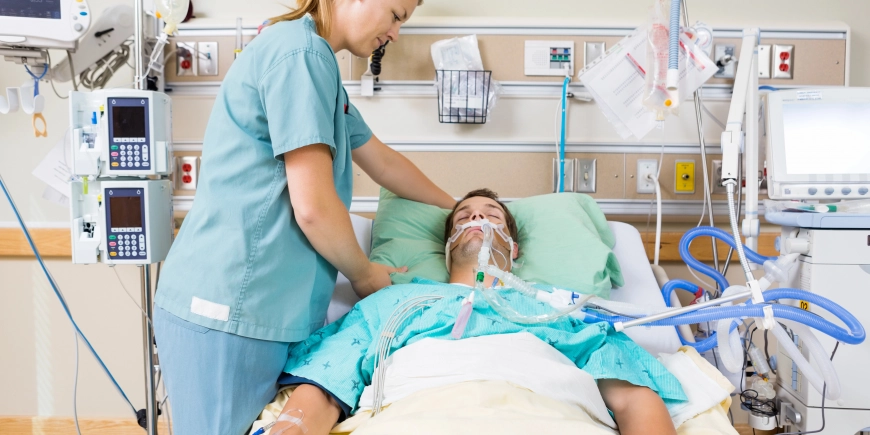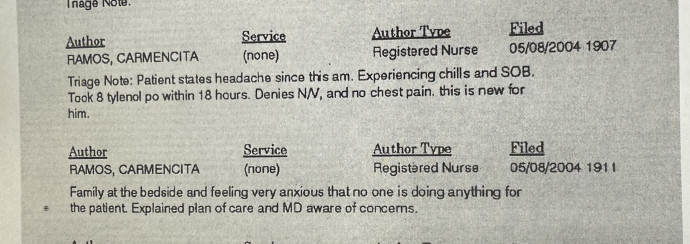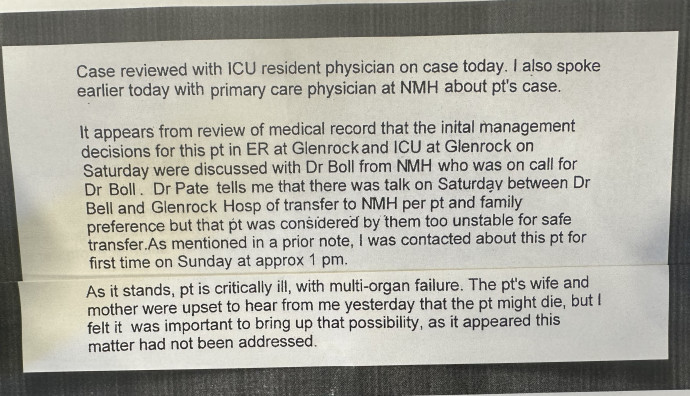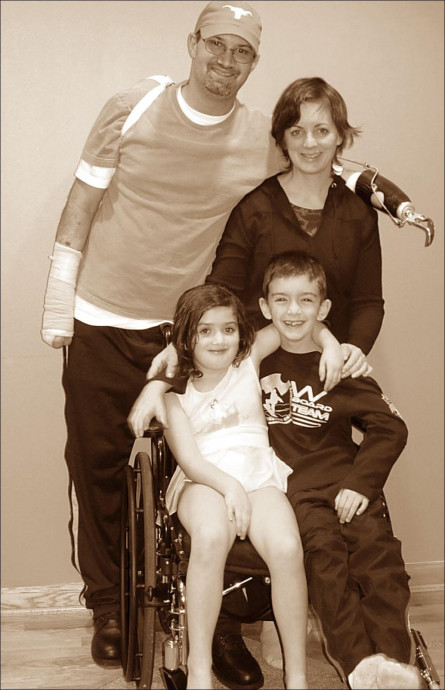From Near Death to GNA: It Was 20 Years Ago Today

May 8, 2024 marks the twentieth anniversary of the delayed diagnosis that forever changed everything for me. Each year, as this date approaches, I reflect on the seemingly carefree life I was leading—happily married, with wonderful grammar school-aged children, enjoying an early May weekend that hinted at the blossoming of spring. I was a trial lawyer with my own growing practice, and I was living the dream. That year, May 8 coincided with Mother’s Day weekend, and just like today the weather was perfect.
During the night of May 7, I started getting a headache. Sure, I’d had headaches before. But I was not prone to migraines, and I could usually point to the cause (ie: staying up too late, loud music, etc.). But this felt different, and it was getting worse. I took Tylenol and attempted to sleep, but by 3 or 4 a.m., I woke up because my whole body was shaking and trembling. My head was pounding, and it hurt to move. I drank water, took more Tylenol, and tried to sleep. Looking back, I knew something just wasn’t right.
I was set to coach my son’s little league game that morning and lead a soccer practice in the afternoon. But I didn’t feel good. During the little league game, I had no energy, so I sat under a tree in the shade wearing sunglasses because the sun was making my headache completely unbearable. I never made it to the soccer game. Instead, I buried myself in the bedroom with the shades closed and my head pounding. I did not want to be the loser husband and son with a headache on Mother’s Day weekend. My wife took my pulse and called 911.
The Prelude to a Crisis
The medical system can fail anybody at any place and at any time. I was an educated, confident, well-spoken patient when I entered the hospital. I knew the importance of providing an accurate history, which I did. I also knew it was important not to be in a hospital alone, so I had family members with me. Having litigated medical issues for many years, I knew the medical lingo and jargon. I was accustomed to speaking my mind and convincing others to listen to me.
I’d sat across the table from doctors hundreds of times, asking them tough questions at depositions and cross-examining them at trial. I was used to looking medical professionals in the eye and asking them about the details of their care, treatment, hospital procedures, medical records, and billing practices. I felt like I was the kind of guy that was fully equipped and fully capable of advocating and standing up for myself. But, as is often the case when you become the patient, all your knowledge, training, and instincts go out the window. You become a subservient victim at the mercy of skilled, but very busy humans, who are prone to make mistakes.
Arrival By Ambulance
When I arrived in the Emergency Department at the hospital at about 4:30pm on Saturday afternoon, it certainly looked to me like a lot of the staff had put in notice to take the weekend off and spend it with family as opposed to treating patients in the hospital. I didn’t know it at the time, but there were substitute doctors in the Emergency Department that afternoon. But the physicians don't tell you, “Hey, I don't really work here. I'm just a substitute.”
In my case, the physicians weren’t just substitutes…they were designated in my chart as “moonlighting physicians.” That’s how the hospital referred to the physicians responsible for my care in the ER that evening. They were overworked doctors working second jobsto make ends meet during the midnight shift on a Saturday night in the ER. Nice.
The paramedics helped me into the emergency room. I was able to walk, with assistance, at that time. I was triaged and they drew my blood. When blood is drawn in an ER, it's an automatic emergency. It's called STAT. So, if an order for bloodwork comes from the ER, nobody has to say, “Hey lab, can you get to this right away?” That’s not necessary, because the lab techs know the request is coming from the ER. Typically, STAT lab results are ready within about 45 minutes.
Shift Changes
Hours passed. I had family by my side. And we were all wondering why the doctors weren't coming in, why nobody seemed to be paying attention. We could hear the chatter and laughter from down the hall as the ER staff discussed their weekend plans and joked around. They sounded like they were wrapping up for the day and a new shift was about to take over.
It’s often during these shift changes that bad things happen. When nurses change shifts, it’s called a handoff. It's supposed to be a coordinated thing where the nurse that’s leaving brings the new nurse around to meet each patient and get briefed on the patient’s condition and status. That didn't happen. Because my main complaint was a headache, nobody took me seriously. In fact, nobody had even mentioned the lab results that showed I was going septic right there in the Emergency Room.
When you become the patient, all your knowledge, training, and instincts go out the window. You become a subservient victim at the mercy of skilled, but very busy humans, who are prone to make mistakes.
It turns out my blood test results actually were sent down to the ER promptly. The lab report noted that many of my blood markers were at PANIC levels that required immediate and targeted medical attention. From abnormally high WBC to panic levels for platelets, kidney function, etc. The problem is that my labs were sent down to the ED right in the middle of one of those shift changes, and nobody saw them.

Chart note 5 hours after I arrived at the ER confirming family is anxious because of lack of care
Two hours pass. What's going on? Where is the doctor? Three hours pass. How come nobody's doing anything? Is there a plan? Although my vital signs and blood test results signaled a critical emergency, nobody realized I had bacterial meningitis because nobody took any cultures. Not a single member of the entire ER team had any clue that I would be dead in a matter of hours if I did not receive antibiotics. A spinal tap would have revealed the meningitis, but by the time the medical team even considered an infection, my platelet count was so low that a spinal tap would have caused me to bleed out.
All Hands on Deck
I finally received medical attention more than 8 hours after I arrived. I started gasping for air and all the buzzers and alarms started going off. There was a flurry of activity and about 10 doctors and nurses were hovering over me, frantically yelling out orders, calling in specialists, and ordering medications as they rushed me to the Intensive Care Unit, probably thinking to themselves, “How did we miss this?”

My attending physician's note describing that I might die, and disclaiming responsibility for it.
In medical terms, I was coding. All my organs were shutting down. Within minutes, I was sedated, intubated, and placed on life support for nearly a month. When I came out of an induced coma, I learned that I went blind in one eye and that I would lose all my limbs.
From Legal Defense to Patient Advocacy
I'd been defending insurance companies my whole life in medical cases. I was now the patient who became the victim. Ultimately, I was a plaintiff in my own medical malpractice case against the hospital and the doctors who missed all the clear warning signs of Sepsis that almost took my life.
With my family in November 2004, not long after I was discharged.
When I returned to work as a lawyer, I wanted to represent malpractice victims, sepsis survivors, and amputees who were misdiagnosed. My personal medical experience made me an attractive and credible advocate for those harmed by medical negligence, and I figured people would want to call me if they've been injured because I had been through it. So, I became a medical malpractice lawyer, and the patients started calling. My phone began ringing off the hook.
But as any medical malpractice lawyer will tell you, when clients call, they've got medical issues. They have medical complaints. They’re angry because what's supposed to be done is not being done. Sometimes it's medical malpractice. But more times than not, it's a «customer service» issue or a communication problem. The calls would range from, “My doctor is not returning my phone calls,” and “The clinic can't find my chart” to “They told me that this was going to be covered by insurance, and it isn't.”
I learned really quick that most of the people who have a complaint with the medical system feel that the only avenue is litigation. They don't know there are people out there all over the country who are qualified to consult with patients and families, to help them communicate with their doctors.
Everybody thinks it’s easy to sue hospitals and doctors but there's not always a legal case. In fact, most of the time, there’s not a case at all. But patients don’t know who else to call when their doctor ignores them or overcharges them. I learned really quickly that most of the people who have a complaint with the medical system feel that the only avenue is litigation. They don't know there are people out there all over the country who are qualified to guide patients and families to help them communicate with their doctors. Neither did I.
Attorneys simply don't know what to do when somebody calls with a medical problem that's not a malpractice case. Most medical malpractice firms have staff that are trained to screen those calls when they come in. So, patients are calling lawyers because their doctor appointments keep getting canceled, or they are looking for a second opinion. Those lawyers and their staff are saying,“I'm sorry, There's nothing I can do for you.”
I had convinced myself that if I had a qualified patient advocate with me in the emergency room back in 2004, I probably would not have lost a single limb, and I was determined to prevent what happened to me from happening to anyone else.
But these patients have medical complaints, and they're angry because what's supposed to be done is not being done. Sometimes it's medical malpractice. But more times than not, it's a communication problem. Good luck finding a lawyer to handle a case that's really just a communication issue. They don't. So, l started asking all my medical malpractice lawyer friends, “What do you do when these patients are clearly in need and hurting because the medical system has failed them?” The only reason they're calling a medical malpractice lawyer is because they don't know who else to call. The universal response was that lawyers are sending patients away because they don’t know what else to do. And that really started to bother me.
I started looking around. It turns out there are literally thousands of clinicians all over the country who were working in health care. And they were just as fed up as patients like me who had experienced a complete breakdown of our healthcare system. And a select handful of them started doing a thing called patient advocacy.
The Birth of Greater National Advocates
Around 2012, I started making a lot of inquiries to the patient advocates, healthcare navigators, nurse advocates, health coaches, etc. who were practicing in geographic clusters across the country. I discovered a loosely connected network of former nurses, social workers, and case managers who had left the institutional side of healthcare in favor of working directly for patients and families.
Then, I started to travel. I attended regional advocacy meetings in Seattle, Boston, Florida, and Arizona where I met the pioneers in this emerging field of advocacy. I became so impressed with the concept and potential of “Independent Patient Advocacy” that I got involved big time.
I had convinced myself that if I had a qualified patient advocate with me in the emergency room back in 2004, I probably would not have lost a single limb, and I was determined to prevent what happened to me from happening to anyone else.
Within a few short years, I started a local group of Chicago-area patient advocates and we called ourselves, “Greater Chicago Advocates.” We met monthly to discuss cases and share ideas. I began to serve on the Board of Directors of NAHAC (National Association of Healthcare Advocacy Consultants) and the newly founded PACB (Patient Advocate Certification Board).
By this time, I had convinced myself that if I had a qualified patient advocate with me in the emergency room back in 2004, I probably would not have lost a single limb, and I was determined to prevent what happened to me from happening to anyone else.
I started Greater National Advocates in 2017 as a nonprofit with a mission to wake up the nation to the life-saving benefits of independent patient advocates and to make them available to everyone in the country. To me, it doesn't matter whether they're coming from a nursing background, a medical background, social work, or experience helping others. If someone can help people in need, I think their services should be known and made available.
Right now, GNA has Independent Patient Advocates across the country who come from all different types of backgrounds, with all different types of experience. And the one unifying fact here is that everybody that is an Independent Patient Advocate brings with them what they have learned, what their experiences were while working in health care, and taking that to the private sector and making their services available directly to patients and families.
While the GNA mission is to introduce the concept of patient advocacy to the general population, I’ve found it just as daunting to convince many “would be” or “could be” advocates that they already are advocates. And that’s a big area where I need support. It’s not just the clinicians and the people who work in hospitals that make great Independent Patient Advocates. Some lay people are entering into the profession as well. People like me, for example, who have survived something.
My GNA Goal
I want Independent Patient Advocacy to become a common everyday household term. For example, when you burst a pipe, you call a plumber. When you get a ticket or get sued, you call a lawyer. When your taxes are due, you call an accountant. Right now, nobody knows that when you’re planning a medical procedure or you’ve got a new medical condition or a health insurance problem or a billing question, you have the right and the ability to have an Independent Patient Advocate by your side, every step of the way.
I am committed to integrating independent patient advocacy into standard healthcare practices. My goal is to see Independent Patient Advocates become as fundamental to healthcare as medical professionals themselves, ensuring patient safety and improving quality of care. I envision a time when patients enter a hospital or doctor’s office, they are not only for asked their insurance information and the name of their primary care physician. I also want the following question to be asked: “Who is your patient advocate?”
Calling All Advocates
If you’re a patient advocate, BCPA, case manager, RN, discharge planner, Aging Life Care professional, social worker, family caregiver, rare disease survivor, pharmacist, peer support mentor, legal nurse consultant, or otherwise experienced with navigating our healthcare system, join us and get listed on the country’s largest national directory for Independent Patient Advocates. Patients and loved ones will hire you for the unique, lifesaving services you provide.
For experienced healthcare workers looking for a career change, learn more at GNANOW.ORG and fill out your profile application at www.GNANOW.ORG/advocates.

